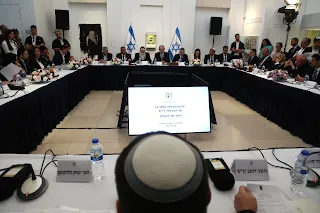The official Israeli Broadcasting Corporation reported: "The security cabinet will hold a crucial session this evening to discuss the future of operations in Gaza, amid stalled negotiations with Hamas and the lack of progress in the exchange deal, despite pressure on the ground."
The meeting comes amid divergent views among ministers, with some calling for a comprehensive war and others supporting a gradual escalation to improve the terms of negotiations with Hamas and recover the Israeli captives from the Gaza Strip, according to the committee.
She noted that Israel "hoped that the resumption of military operations and the halt to the entry of humanitarian aid would lead to Hamas's softening of its position and its willingness to accept US envoy Steve Witkoff's proposal. The government was even prepared to accept a partial formula that would have led to the release of 7 to 11 live prisoners in exchange for significant concessions."
She continued, "Although Hamas showed some signs of flexibility, it formally rejected the proposal, and negotiations have effectively stalled since the end of the week."
In response to Tel Aviv's intransigence and evasiveness, Hamas leader Khalil al-Hayya announced a few days ago the movement's readiness to immediately begin "comprehensive package negotiations" to release all Israeli detainees in one go, in exchange for an end to the genocide and a full withdrawal from the Gaza Strip.
"Amid the stalemate in negotiations, the government is convinced that the only way to effect change is to escalate military pressure, but sharp disagreements are emerging within the cabinet over how to implement this," the commission said.
She added: "Prime Minister Benjamin Netanyahu, Defense Minister Israel Katz, and most of the Likud ministers (led by Netanyahu) see the need to continue gradual pressure, in the hope that Hamas will be forced to make concessions over time."
She added: "In contrast, the ministers of 'Religious Zionism', Bezalel Smotrich and Orit Strook, are calling for an immediate return to all-out war with the aim of decisively ending the battle, as stated in the war's declared objectives from the outset."
The committee continued: "The meeting scheduled for this evening will likely decide between these two approaches, with the possibility of adopting a middle ground formula. The army's position will play a decisive role in the deliberations."
Meanwhile, the families of the detainees and some 142,000 Israelis are calling for a comprehensive agreement to return all detainees at once, even if it requires an end to the war on Gaza. However, the government rejects these calls, insisting that it can force Hamas to accept its position through military pressure, including extensive airstrikes.
Hamas has repeatedly affirmed its readiness to hand over all detainees at once, but Netanyahu is stalling by seeking partial deals that keep the war of extermination ongoing, according to the Israeli opposition and the detainees' families.
The first phase of a ceasefire and prisoner exchange agreement between Hamas and Israel, which had been in effect since January 19 through Egyptian-Qatari mediation and US support, ended on March 1, and was adhered to by the Palestinian movement.

